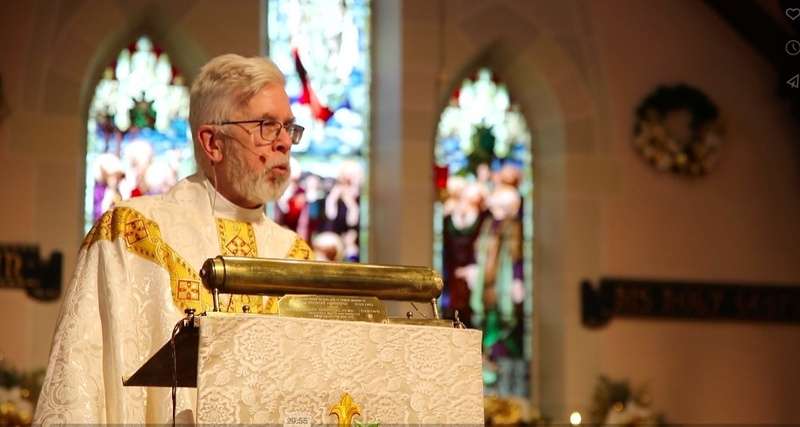The Bonfire of the Tyrannies. A Sermon for Christmas Day. Preached at All Saints, Collingwood, Anglican Diocese of Toronto, 25 December, 2022.
Readings for this day: Isaiah 62:6-12, Ps 97, Titus 3:4-7, Luke 2:1-20

5For all the boots of the tramping warriors and all the garments rolled in blood shall be burned as fuel for the fire. 6For a child has been born for us, a son given to us; authority rests upon his shoulders; and he is named Wonderful Counselor, Mighty God, Everlasting Father, Prince of Peace. (Isaiah 9:5-6)
These words from Isaiah, from our Christmas Eve readings, have been much on my mind these last few days. The image of God overthrowing oppression, of a child being more powerful than terrible armies, speaks to us as much now as it would have done when it was first written.
When the prophet Isaiah first wrote these words, the “tramping warriors” would have been the soldiers of Assyria, one of the most ruthless and militaristic powers of the ancient world, whose armies had almost overrun Israel.
Today the “tramping boots of the warriors” could refer to Putin’s thugs in the Ukraine, or to the Iranian regime’s police in the streets of Tehran, beating and shooting courageous young women and their brothers who just want to be free. The tramping boots of the warriors are the junta’s soldiers in the streets of Myanmar, they are Boko Haram who haunt villages in Africa, they are the narco gangs who kill innocents in the towns of Mexico.
Isaiah promised us a saviour who will deliver us from the men of violence. Through the weeks of Advent we have heard this promise. We have heard the promise of the one who will show us “the glory of the Lord, the majesty of our God”, have been told that he will “come with vengeance, with terrible recompense. He will come and save you” (Isa 35:4).
We remember Mary’s song, when she learned that the one she would carry would show “strength with his arm” and pull down “the mighty from their thrones” (Lk 1: 51-52). So we look for this one who will come to topple tyrants and rout their tramping warriors, and we find him this day. We find him an infant, a manger, the poor child of nobody parents. As N.T. Wright has said, no appearance of God could be further from what we imagine. No transcendence, no power and majesty, just human helplessness and the dependence of an infant.
What good is such frailty in a harsh world? Will our deliverance come from a child such as this? Indeed, the “tramping boots of the warriors” are never far from the Nativity story. In Matthew’s gospel they are sent by Herod to find and kill the one sought by the Magi. The Holy Family flee Bethlehem just steps ahead of a massacre.
For such thoughts, the opening words of St. John’s gospel are required. St. John says of Jesus “What has come into being 4in him was life, and the life was the light of all people. 5The light shines in the darkness, and the darkness did not overcome it.” (Jn 1:3-5). Here I think is the great hope of Christmas, that Jesus is the light that comes into the world to lead us to the good at the same time as it exposes the darkness for what it is.
That same star which shines kindly on the travelling Magi is the very light that exposes the deeds of Herod’s soldiers. And here I think is one great hope of the Christian faith, that the good always shows most clearly and most attractively in the greatest darkness. Every tyrant’s reign ends in shame and ruin. The mass graves will be dug up, secrets are exposed, prisoners are freed, the war criminals will be brought to justice, truth and reconciliation and God’s justice will prevail. Such are the hopes that we bring to the child in the manger.
I owe these thoughts to the poet Malcolm Guite and his poem, “The Refugee”.
We think of him as safe beneath the steeple,
Or cosy in a crib beside the font,
But he is with a million displaced people
On the long road of weariness and want.
For even as we sing our final carol
His family is up and on that road,
Fleeing the wrath of someone else’s quarrel,
Glancing behind and shouldering their load.
Whilst Herod rages still from his dark tower
Christ clings to Mary, fingers tightly curled,
The lambs are slaughtered by the men of power,
And death squads spread their curse across the world.
But every Herod dies, and comes alone
To stand before the Lamb upon the throne.
Herod and Putin will come before the same child born in Bethlehem. For the child will be their judge, and he will set his people free, free to dance one day around the bonfires of all tyrannies. “The boots of the tramping warriors and all the garments rolled in blood shall be burned as fuel for the fire.”
Such, dear saints, is the paradox of Christmas, that only a child such as this can set us free and save us.

Thank you, sir????‼️